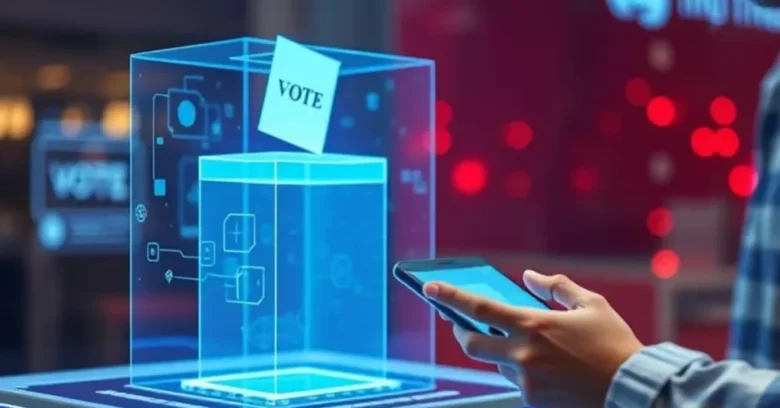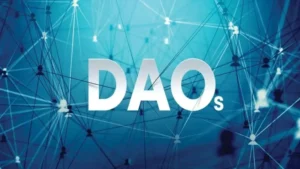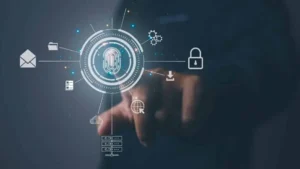In an era where digital transformation is transforming many businesses, blockchain-based voting is becoming increasingly popular as a way to improve democracy. Fraud, inefficiency, and lack of transparency plague traditional voting methods. This dilemma has prompted people to seek more secure alternatives. Blockchain technology, which is autonomous and immutable, seems like a beneficial option. Blockchain has the potential to transform voting worldwide by making voting data verifiable, clear, and immutable. However, concerns about convenience, security, and public trust remain significant. This article examines whether decentralized voting is truly the trend of the future or merely a grand experiment.
How Blockchain Technology Works and What It Means for Voting:
Blockchain is a decentralized digital ledger that keeps track of events across multiple computers. This ensures security and transparency. Once the information in each “block” is verified, it is permanently added to the “chain,” making it very difficult to alter. Blockchain can be used to store votes as encrypted events in voting systems. This prevents vote tampering and guarantees accuracy. Unlike traditional methods, blockchain doesn’t have a central authority to manage the entire process. Instead, responsibilities are distributed across multiple nodes, reducing the chance of someone changing the rules. The technology also allows voters to view their ballots without revealing their names, making the voting process more private and reliable.
Potential Benefits of Blockchain Voting:
One of the biggest benefits of blockchain voting is the elimination of fraud. Because each vote is encrypted and recorded across multiple nodes, it’s difficult to alter the results. Furthermore, blockchain can improve liquidity and allow people to vote remotely, which is very convenient for those who can’t go to the polls in person. Because blockchain is open, anyone can view the voting process without revealing the voter’s identity. Furthermore, the technology can reduce human error and speed up the counting of votes, improving the accuracy and speed of results. If these benefits are realized, more people can participate in the vote and gain confidence in the political system.
Problems and Risks of Central Office-Free Voting Systems:
Although blockchain voting has promising prospects, it also presents several significant problems. Hacking and phishing attacks are examples of cybersecurity risks that can still invalidate voter IDs. People are starting to worry about digital exclusion because some lack access to the necessary technology. Furthermore, the complexity of blockchain could deter some voters from voting, reducing voter participation. It is also difficult to implement such systems on a large scale due to the lack of sufficient legislation and regulations. Finally, concerns about new technologies, such as the continued distrust of electronic voting in many places, could reduce the likelihood of their adoption. Before blockchain can become a mainstream voting method, we must address these problems.
Test Cases for Blockchain Voting in Practice:
Many countries and groups have already experimented with blockchain-based voting. This made West Virginia the first state in the United States to use blockchain in the 2018 federal elections. They did this by testing a mobile voting app for military personnel abroad. Estonia, a pioneer in digital governance, has investigated the potential of blockchain to enhance the current electronic voting system. Sierra Leone used Bitcoin to a limited extent during the 2018 presidential election. While these tests show promise, they also highlight certain scientific and practical challenges that require attention. We need more testing and improvements before we can use blockchain on a large scale.
How People View and Trust Blockchain Voting:
People must trust blockchain voting for it to work. Many voters remain skeptical of computer systems due to their perceived vulnerability to hacking or deception. Governments and groups must educate people about how blockchain can protect privacy and security. Small-scale projects and pilot projects can build trust by demonstrating their reliability. Independent research and open-source blockchain design can also enhance credibility. In the political process, even the most secure system will be difficult to adopt without public support.
How Decentralized Voting Will Shape the Future of Democracy:
Blockchain-based voting has the potential to transform democracy by making voting more secure, open, and accessible to everyone. However, we still need to address some significant technical, legal, and social issues. As cybersecurity and digital literacy improve, blockchain has the potential to become a standard component of election systems. A hybrid model that incorporates both standard and blockchain methods could serve as a transitional approach between the two systems. Ultimately, technologists, politicians, and the public will all need to work together to make decentralized voting work.
Conclusion:
Blockchain-based voting is an exciting yet challenging change in how democracy functions. It is a powerful alternative to traditional systems because it can improve security, openness, and efficiency. However, issues such as cybersecurity risks, accessibility issues, and general skepticism should not be ignored. Field tests have revealed its strengths and weaknesses, indicating the need for further work. As the technology improves and trust grows, decentralized voting could be crucial to the future of democracy. For now, it continues to be an intriguing project with the potential to revolutionize global election processes.
FAQs:
1. Is voting via blockchain completely secure?
Blockchain is very secure because it is encrypted and not controlled by a single entity. However, every system carries risks. Cybersecurity risks such as fraud and malware remain difficult to manage.
2. Can voting via blockchain attract more people to vote?
Yes, blockchain can help people who can’t go to the polls vote from home or on their phones.
How does blockchain protect voter privacy?
Blockchain stores votes as encrypted transactions, meaning voters’ names are not visible during the verification process. This feature protects privacy.
4. What are the main issues with voting with Bitcoin?
The biggest issues include concerns about cybersecurity, the lack of universal digital access, legal barriers, and a general distrust of electronic voting methods.
5. Which countries have successfully used blockchain technology for elections?
Estonia and Sierra Leone are two countries using blockchain technology for elections, but their widespread adoption is still in its infancy.




